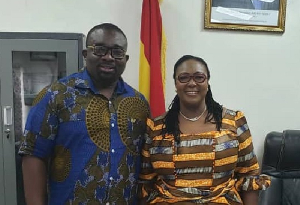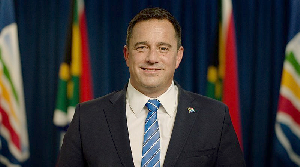Opinions of Tuesday, 6 February 2024
Columnist: Michael Agbesi Kelly
Disinformation and politics: The dangers it poses in building the Ghana we want
In this digital age, the spread of disinformation has become a pressing concern, especially when it intersects with politics. Ghana, like many other countries, is not immune to this threat. Disinformation, often spread through social media platforms, can have far-reaching consequences for the democratic process, social cohesion, and the overall development of the nation.
This article aims to shed light on the dangers of disinformation in politics and its impact on building the Ghana we want.
Undermining Trust in Democratic Institutions: Disinformation campaigns can erode public trust in democratic institutions, such as the government, electoral processes, and the media. False narratives and fabricated stories can create doubt and confusion among citizens, leading to a loss of faith in the political system. This can undermine the legitimacy of elected leaders and institutions, hindering progress and stability.
Polarization and Social Divisions: Disinformation often exploits existing social divisions and amplifies them for political gain. By spreading false information that fuels hatred, fear, and prejudice, it deepens societal divisions along ethnic, religious, or ideological lines. This polarization weakens the social fabric of Ghana, hindering cooperation and hindering progress towards a united nation.
Impeding Policy-making and Development: The spread of disinformation can impede effective policy-making and hinder progress in various sectors. When false information circulates, it can influence public opinion and shape political decisions based on inaccurate or misleading data. This can lead to ill-informed policies, misallocation of resources, and missed development opportunities.
Threat to Electoral Integrity: Disinformation poses a significant threat to the integrity of elections. False information about candidates, parties, or the voting process can manipulate public opinion, distort the electoral playing field, and undermine the credibility of election outcomes. This erodes citizens’ faith in the electoral process and can lead to political instability and unrest.
Mitigating the Threat of Disinformation: To combat the dangers of disinformation in politics, a multi-faceted approach is required. This includes:
Promoting Media Literacy: Educating citizens about critical thinking, media literacy, and fact-checking can empower them to discern accurate information from disinformation.
Strengthening Media Integrity: Supporting independent journalism and fact-checking organizations to ensure accurate and reliable information is readily available to the public.
Regulatory Measures: Implementing appropriate regulations and guidelines to hold platforms accountable for the spread of disinformation while safeguarding freedom of speech.
Collaboration and International Cooperation: Building partnerships among governments, civil society, and technology companies to develop strategies and share best practices in combating disinformation.
The dangers of disinformation in politics cannot be underestimated. It undermines trust, fuels social divisions, impedes development, and threatens the integrity of democratic processes. Ghana must recognize this threat and take proactive measures to address it. By promoting media literacy, strengthening media integrity, implementing regulations, and fostering collaboration, Ghana can build a resilient society that is better equipped to counter disinformation and work towards building a better nation.













